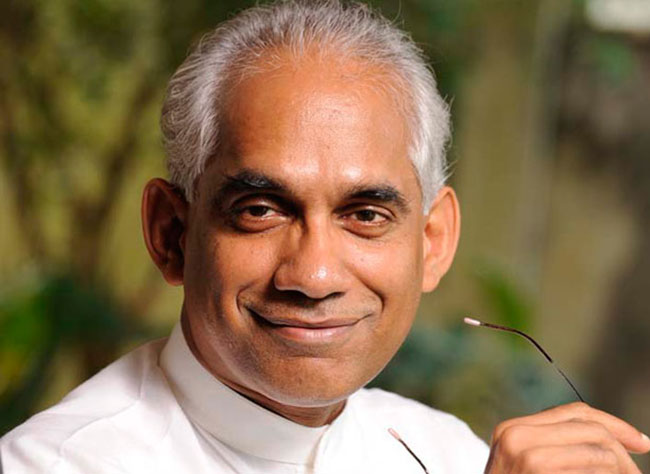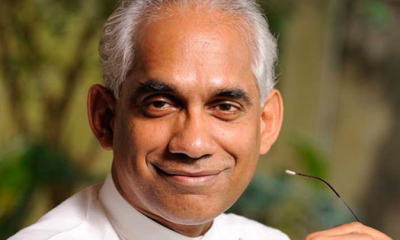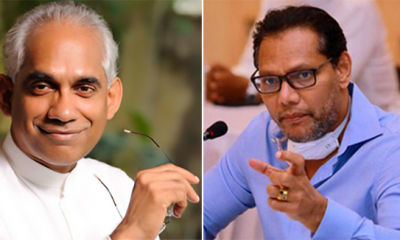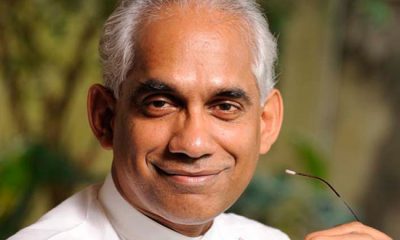News
Public officials have the responsibility to see whether budget promises are fulfilled – Eran

Sri Lanka, as a debt-ridden and bankrupt country, it is upon the Public Officials to ensure that budget promises are fulfilled, stated Eran Wickramaratne MP. As the month-long Budget debate came to an end, a reality check of the Budget proposals is a necessity. He emphasised that all heads of ministries and departments should fulfill their accountability and responsibility in this regard.
In general, governments in this country do not attain state revenue presented by budgets. The revenue forecast in the Budget of 2023 will decrease by about 15%. It has been estimated that the state income in 2024 will increase by 45% over the actual income in 2023. It can be said right now, that this is not achievable. But this should be analyzed.
State revenue in 2024 is projected to be about Rs. 4 trillion and expenditure about Rs. 8 trillion, a deficit nearing Rs. 4 trillion. Country’s debt is 128% of GDP, with plans to bring it down to 95% by 2032. Debt restructuring is essential, without which the goal to bring down debt to 95% by 2032 will not be attainable. We are happy that the International Monetary Fund has approved the second loan tranche and the agreement of the lending countries to restructure debt.
Wickramaratne, focusing on large-scale foreign funded projects of which there are approx. 116, said that 61 are underperforming and funding has been suspended for 31. He emphasised the importance of adopting methodology to assess for appraisal performance and progress, driving implementation.
The Budget proposes the establishment of new investment zones. There were such proposals since 2017 but none have come to fruition to date. The Auditor General himself had stated that albeit budget allocations, investment zones have not been set up.
In this Budget, there is emphasis on a National Artificial Intelligence Centre with a budget allocation of Rs. 3 Billion. Wickramaratne queried if there had been an appraisal done to this proposed investment with a projected ROI. Access to information on government projects on appraisal and performance is minimal. Inability to obtain information about government projects has increased from 12% in 2016 to 97% by 2023.
We must move away from our set mindset on ownership. Assets/resources belong to the people of a nation and not to a ministry/department or its workers. Assets/resources are of no use to its people, if not utilised and utilised at the right time. Assets/resources must generate financial and economic return to its people. Ownership alone is of no benefit to a nation or its people.
Government owned land is of no use if they do not generate benefit to the people of the country. Resources are of no use if they do not generate benefit to the people of the country. Wickramaratne made reference to a visit he made to Eppawala 20 years ago as the head of National Development Bank. There was resistance to bring in new investment for value addition. To date, Eppawala has not developed to its potential.
If the Middle Eastern countries held on to ownership of its oil resources, rejecting foreign investment, they’d still be Bedouin communities in the desert. These countries have economically advanced in the past 40 years and are now moving into new areas of development. Ironically, with the progression towards green energy, oil as a resource will continue to lose its value over time. In the same light, Sri Lanka has high quality graphene – it must be utilised in a timely manner. If not, with the advancement of science, artificial graphene being developed by China may reduce our potential gains.
The need of the hour is an independent Parliamentary Budget Office for which an allocation is set aside. Initially, the expressway from Colombo to Matara was built. Subsequently, the extension of the expressway from Matara to Hambantota was executed without an assessment of an ROI. Many government projects do not generate benefits to the people because of the absence of proper evaluation.
The MP insisted that we must move away from politicised decision-making to rational policy and managerial decision-making based on economic and financial assessments.
The establishment of an independent Parliamentary Budget Office must be based on a few fundamental principles; – the formation of a budgeting system, the development and execution of a budget based on scientific principles. We have a six-month process for a budget, which should not be the case and inadequate – budgets must be a continuous development – financial management, including that of the executing ministries/agencies performance must be monitored – compliance with law and regulations must be monitored – executive orders must be evaluated and endorsed prior to promulgation.
A clear example of this is the more recent decision to ban chemical fertiliser instantly, for organic fertiliser. Had there been an assessment of this directive by an independent body, it would have been evident that it is an initiative to be rolled out over a 10-15 year period and not one that should be attempted overnight. We would have avoided a catastrophic disaster to the farming industry and to the country in general.
Wickramaratne reiterated that critical decisions made in the recent past and that of the current Budget, should have been vetted by an independent body such as a Parliamentary Budget Office. Personal income tax, defence and welfare expenditure are among the expenditures that need continuous monitoring and are high. Wickramaratne urged the government to set up the independent Parliamentary Budget Office with immediate effect based on critical principles which include procurement, privacy policy and information policy, use of technology, coordination and review of all significant regulations.
In conclusion, Wickramaratne urged the public officials to take it upon themselves to ensure that the Budget is executed and in doing so ensure evaluation of decision-making and monitoring of the progress.
News
US sports envoys to Lanka to champion youth development

The U.S. Embassy in Colombo welcomed the U.S. Sports Envoys to Sri Lanka, former National Basketball Association (NBA) and Women’s National Basketball Association (WNBA) players Stephen Howard and Astou Ndiaye, from June 8 through 14.
The Public Diplomacy section of the U.S. Embassy said that it would launch a weeklong basketball program intended to harness the unifying power of sports, made possible through collaboration with Foundation of Goodness and IImpact Hoop Lab.
While in Sri Lanka, Howard and Ndiaye, both retired professional basketball players, will conduct a weeklong program, Hoops for Hope: Bridging Borders through Basketball. The Sports Envoys will lead basketball clinics and exhibition matches and engage in leadership sessions in Colombo and Southern Province for youth aged 14-18 from Northern, Uva, Eastern and Western Provinces, offering skills and leadership training both on and off the court. The U.S. Envoys will also share their expertise with the Sri Lanka Basketball Federation, national coaches, and players, furthering the development of basketball in the country. Beyond the clinics, they will collaborate with Sri Lankan schoolchildren to take part in a community service project in the Colombo area.
“We are so proud to welcome Stephen and Astou as our Sports Envoys to Sri Lanka, to build on the strong people-to-people connections between the United States and Sri Lanka,” said U.S. Ambassador Julie Chung. “The lessons that will be shared by our Sports Envoys – communication, teamwork, resilience, inclusion, and conflict resolution – are essential for leadership development, community building, equality, and peace. The U.S. Sports Envoy program is a testament to our belief that sports can be a powerful tool in promoting peace and unity.”
News
Rahuman questions sudden cancellation of leave of CEB employees

SJB Colombo District MP Mujibur Rahuman in parliament demanded to know from the government the reasons for CEB suspending the leave of all its employees until further notice from Thursday.
MP Rahuman said that the CEB has got an acting General Manager anew and the latter yesterday morning issued a circular suspending leave of all CEB employees with immediate effect until further notice.
“We demand that Minister Kanchana Wijesekera should explain this to the House. This circular was issued while this debate on the new Electricity Amendment Bill was pending. There are many who oppose this Bill. The Minister must tell parliament the reason for the urge to cancel the leave of CEB employees,” the MP said.However, Speaker Mahinda Yapa Abeywardena prevented Minister Wijesekera responding to the query and said that the matter raised by MP Rahuman was not relevant.
News
CIPM successfully concludes 8th Annual Symposium

The Chartered Institute of Personnel Management (CIPM) successfully concluded the 8th Annual CIPM Symposium, which took place on 31st May 2024. Themed “Nurturing the Human Element—Redefining HRM in a Rapidly Changing World,” the symposium underscored the pivotal role of human resource management (HRM) in today’s dynamic global landscape. Since its inception in 1959, CIPM has been dedicated to advancing the HR profession through education, professional development, and advocacy, solidifying its position as Sri Lanka’s leading professional body for HRM.
Ken Vijayakumar, the President of the CIPM, graced the occasion as the chief guest. The symposium commenced with the welcome address by the Chairperson, Prof. Arosha Adikaram, followed by the Web Launch of the Symposium Proceedings and Abstract Book by the CIPM President. The event featured distinguished addresses, including a speech by Chief Guest Ken Vijayakumar, President of CIPM, and an address by Guest of Honor Shakthi Ranatunga, Chief Operating Officer of MAS Holdings Pvt. Ltd., Sri Lanka.
The symposium also featured an inspiring keynote address by Prof. Mario Fernando, Professor of Management and Director of the Centre for Cross Cultural Management (CCCM) at the University of Wollongong, Australia.
Vote of Thanks of the inauguration session was delivered by Dr. Dillanjani Weeratunga, Symposium Co-chair.
The symposium served as a comprehensive platform for researchers to present their findings across a wide range of critical topics in HRM. These included Cultural Diversity and Inclusion, Talent Development and Retention, Ethical Leadership and Corporate Social Responsibility, Adapting to Technological Advancements, Mental Health and Well-being at Work, Global Workforce Challenges, Employee Empowerment, and Reskilling and Upskilling.
The plenary session was led by Prof. Wasantha Rajapakse. Certificates were awarded to the best paper presenters during the valedictory session, followed by a vote of thanks delivered by Kamani Perera, Manager of Research and Development.
The annual symposium of CIPM was a truly inclusive event, attracting a diverse audience that spanned undergraduates, graduates, working professionals, research scholars and lecturers. This widespread interest highlights the symposium’s significance in the field of HRM, offering a unique opportunity for everyone to network and learn from scholarly brains.The CIPM International Research Symposium was sponsored by Hambantota International Port, Sri Lanka Institute of Information Technology (SLIIT), E B Creasy & Co. PLC, and Print Xcel Company.




















